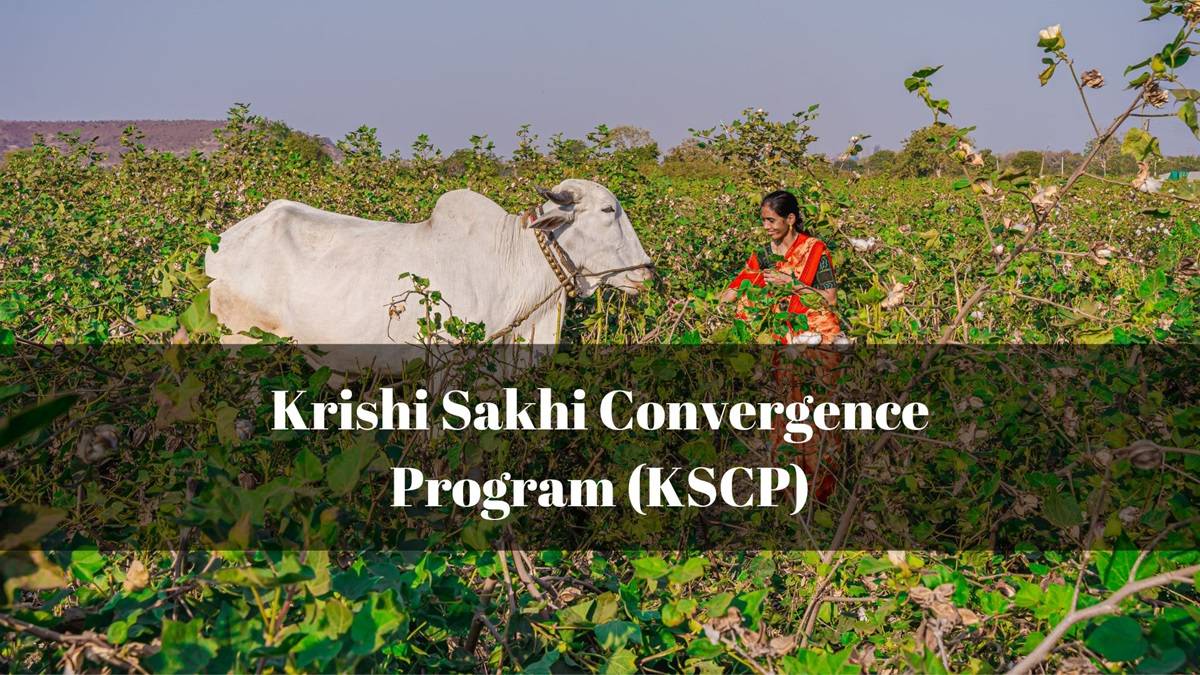Krishi Sakhi Convergence Program: Objective, Training Modules, Employment Opportunities, Certification and More
Krishi Sakhi Convergence Program, supported by the Indian government, aims to improve rural livelihoods and environmental sustainability through comprehensive training and community engagement.

Under the Krishi Sakhi Convergence Program, grassroots-level practicing farmers and trained para-extension professionals, known as Krishi Sakhis, are playing a crucial role in transforming agricultural practices in rural India. Their role as farmers’ friends at the doorstep encompasses providing essential information, skills, and guidance on natural farming and soil health management. This initiative, supported by the Ministry of Agriculture and Farmers Welfare and the Ministry of Rural Development, aims to improve rural livelihoods and standards of living.
What is Krishi Sakhi Convergence Program (KSCP)
Launched through a Memorandum of Understanding (MoU) on August 30, 2023, the KSCP is a key component of the broader 'Lakhpati Didi' program. This initiative aims to create three crore Lakhpati Didis by training and certifying women as Krishi Sakhis, thereby enhancing their agricultural skills and providing new employment opportunities. This convergence aligns with the objectives of the Lakhpati Didi Program, focusing on the empowerment of rural women and the sustainable development of rural India.
Objectives and Training of Krishi Sakhis
The primary objective is to enhance soil health and promote natural farming methods through the deployment of Krishi Sakhis. Recognizing the need for trained professionals in agriculture, both ministries have committed to training 70,000 Krishi Sakhis on natural farming and soil health management in a phased manner.
Post-training, these women will conduct awareness programs in self-help groups (SHGs), schools, anganwadis, gram panchayats, village organizations, and across villages. The goal is to create a ripple effect, where Krishi Sakhis act as catalysts for adopting environmentally friendly and economically viable agricultural methods, leading to improved agricultural productivity, enhanced soil health, and overall community well-being.
Why Krishi Sakhis?
Krishi Sakhis are selected as para-extension workers due to their established status as trusted community resource persons and their extensive farming experience. Their deep connections within farming communities ensure they are well-received and respected, making them effective in their roles. This community trust is crucial for the successful implementation of agricultural extension services.
What kind of training is being provided to Krishi Sakhis?
The training program for Krishi Sakhis is extensive, lasting 56 days and covering various aspects of agricultural extension services. Key training modules include:
-
Agro-Ecological Practices: From land preparation to harvest.
-
Organizing Farmer Field Schools: Facilitating practical learning sessions for farmers.
-
Seed Banks: Establishment and management.
-
Soil Health and Conservation: Techniques for maintaining soil health and moisture.
-
Integrated Farming Systems: Combining various farming practices for sustainability.
-
Livestock Management: Basic management practices for livestock.
-
Bio Inputs: Preparation, use, and establishment of bio-input shops.
-
Communication Skills: Essential skills for effective communication with farmers.
Currently, Krishi Sakhis are receiving refresher training with a special emphasis on natural farming and soil health cards, facilitated by DAY-NRLM agencies in collaboration with MANAGE.
Employment Opportunities and Certification
Following the training, Krishi Sakhis will take a proficiency test. Those who qualify will be certified as Para-extension Workers, enabling them to undertake various MoA&FW scheme activities for a fixed resource fee. For example, in the INM Division: Soil Health and MOVCDNER, activities include soil sample collection, soil health advisory, formation of farmer producer organizations, and training of farmers. The resource fee is INR 1300 for soil health activities and INR 54000 for MOVCDNER activities (only for the Northeast).
In the Crop Insurance Division: PMFBY, activities include mobilizing non-loanee farmers and loss assessment, with a resource fee of INR 20000 per year per Krishi Sakhi. In the Agriculture Infrastructure Fund Division, activities include acting as an outreach agent, facilitating projects, and creating awareness, with a resource fee of INR 5000 per year. Similarly, other divisions have their respective activities and resource fees. On average, a Krishi Sakhi can earn between INR 60,000 to 80,000 annually through these activities.
Current Progress and Regional Implementation
As of now, 34,000 out of 70,000 Krishi Sakhis have been certified as para-extension workers. The Krishi Sakhi Training Program has commenced in 12 states during Phase 1, including Gujarat, Tamil Nadu, Uttar Pradesh, Madhya Pradesh, Chhattisgarh, Karnataka, Maharashtra, Rajasthan, Odisha, Jharkhand, Andhra Pradesh, and Meghalaya.
Under the Mission Organic Value Chain Development for North Eastern Region (MOVCDNER) scheme, 30 Krishi Sakhis work as local resource persons, visiting farms monthly to monitor activities and address farmers' challenges. They conduct weekly Farmer Interest Group (FIG) meetings, providing training and support, earning a resource fee of INR 4500 per month.
The Krishi Sakhi Convergence Program is a transformative initiative that empowers rural women by enhancing their agricultural skills and providing viable employment opportunities.
By recognizing the vital role of women in agriculture, the program supports individual livelihoods and contributes to the broader goal of sustainable rural development. Through their dedication and expertise, Krishi Sakhis are paving the way for a more sustainable and prosperous rural India.
Download Krishi Jagran Mobile App for more updates on the Latest Agriculture News, Agriculture Quiz, Crop Calendar, Jobs in Agriculture, and more.

